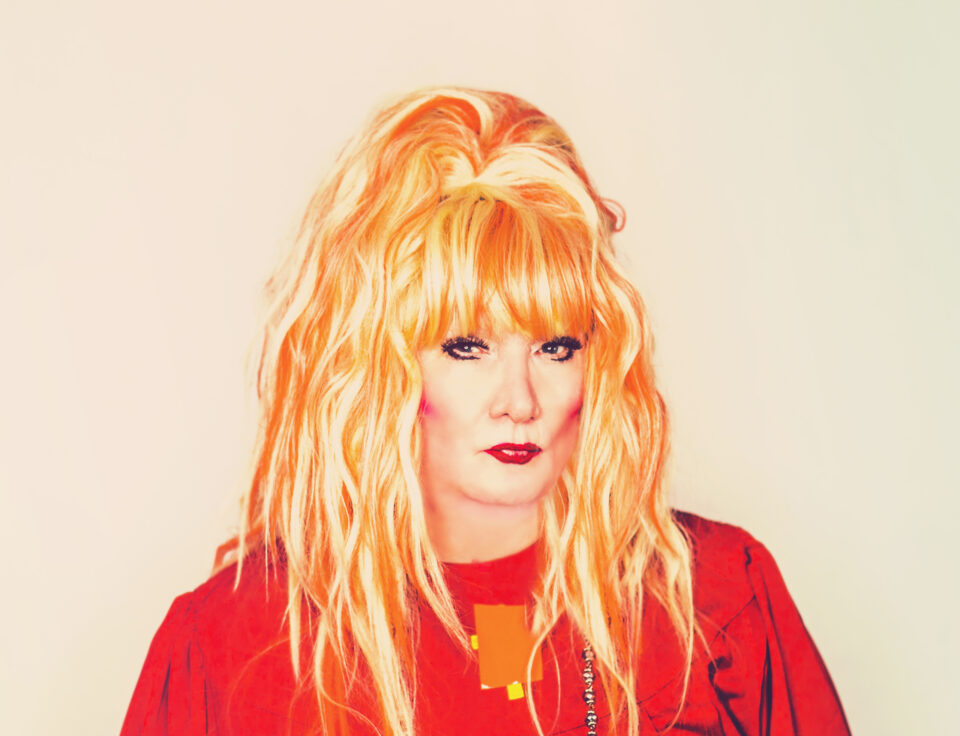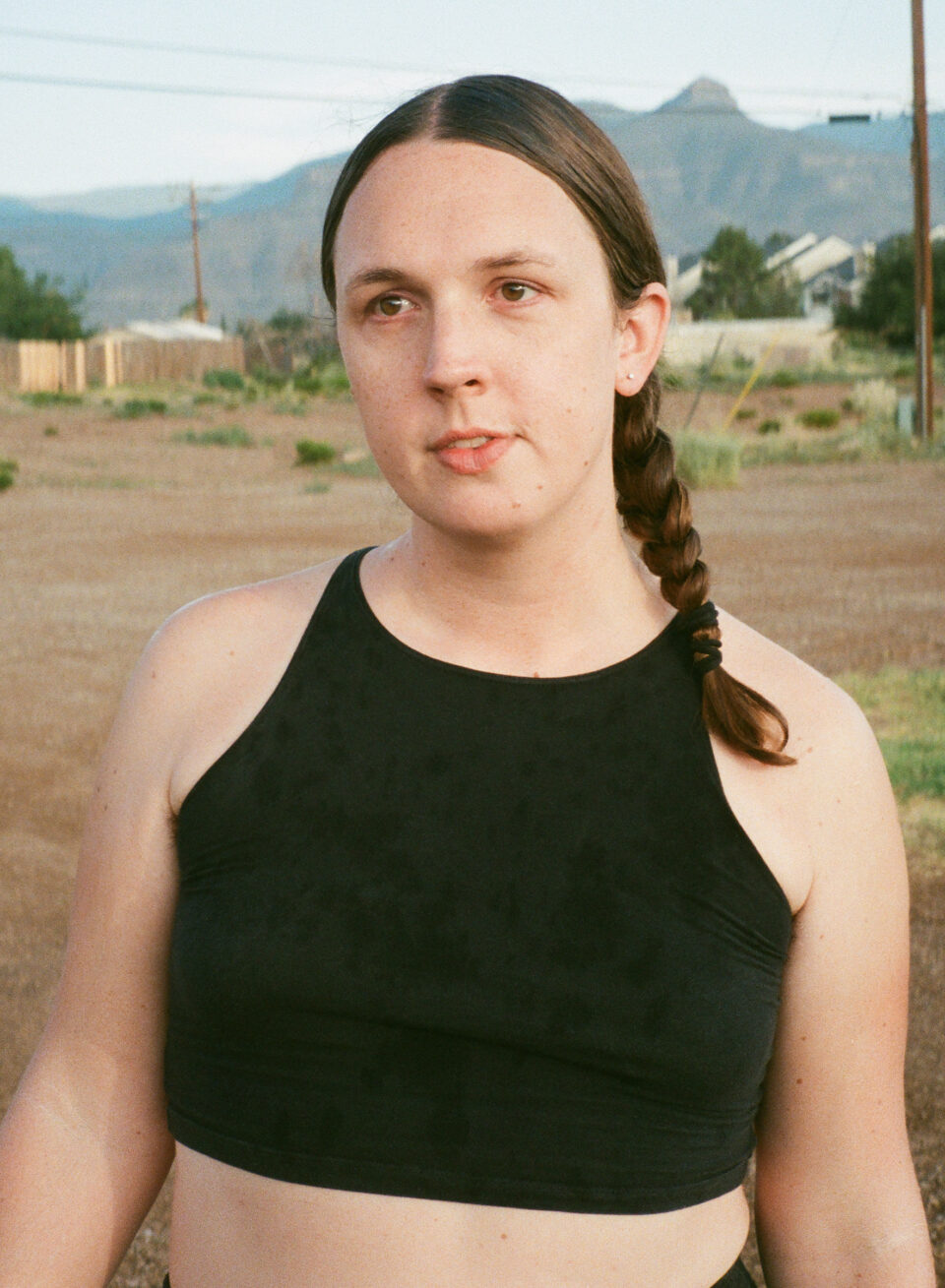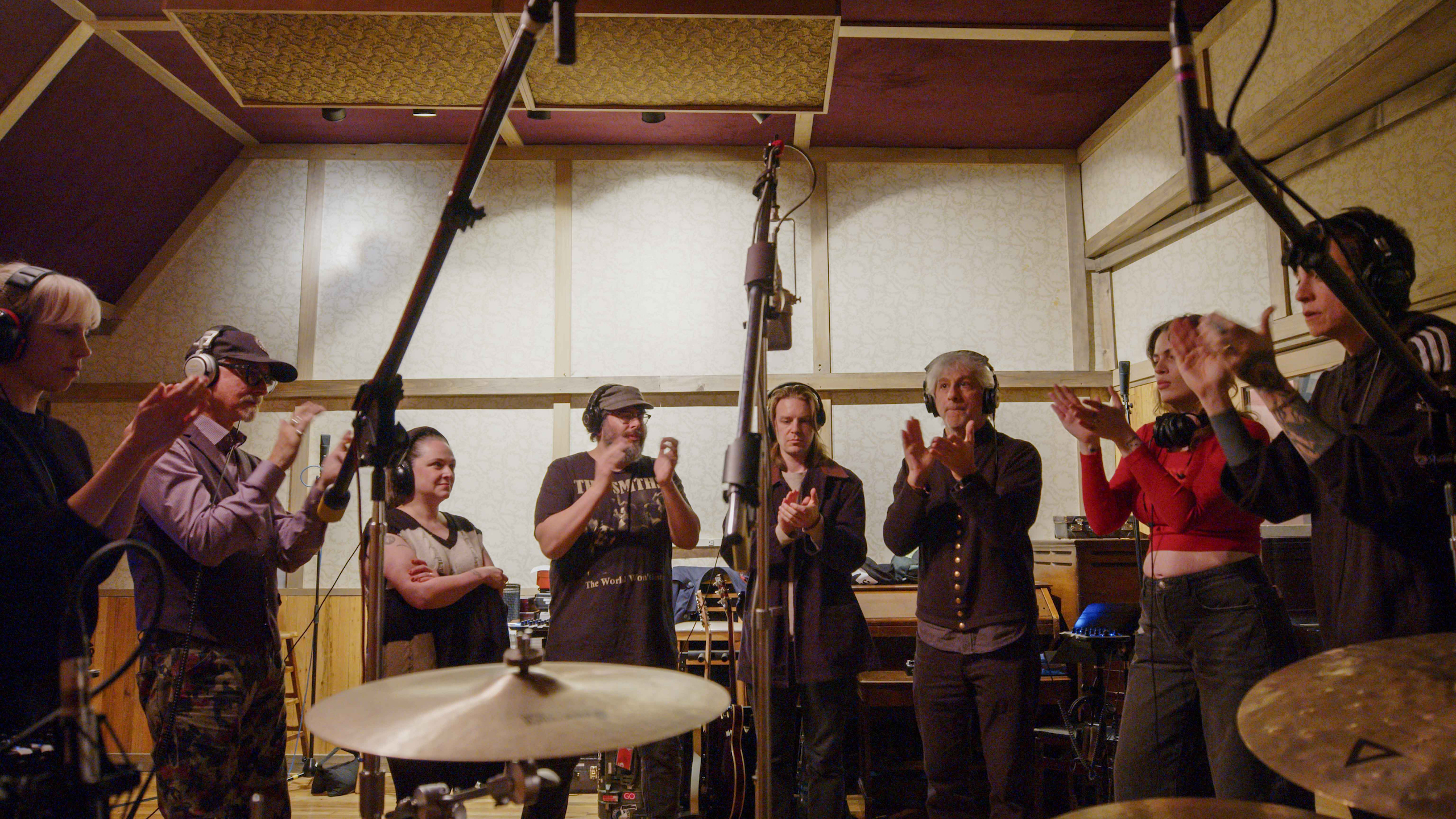Since its first various-artists album for HIV-AIDS charities, 1990’s Red Hot + Blue, producer, curator, and Red Hot Organization co-founder John Carlin has done a ton for LGBTQIA+ communities. Carlin’s Red Hot nonprofit has released 25 compilations and a handful of multi-media projects featuring nearly 500 musicians whose donations total over $12 million for HIV-AIDS relief and awareness globally. “None of this feels like ancient history, it’s still all too present,” Carlin says over Zoom about Red Hot’s work tending to HIV-AIDS care and LGBTQIA+ communities around the world.
What Carlin has never done, however, is focus specific attention on the “T.” Red Hot’s new release TRAИƧA does just that in 46 songs celebrating the trans community at a time when 2025’s President-elect and his cabinet will surely tear many of their rights away. And while TRAИƧA—which is available to order as a limited edition six-LP box set here)—features brand-name artists such as Sade, Sam Smith, André 3000, Moses Sumney, and actress Hunter Schafer, one abrasive centerpiece of the release is “Surrender Your Gender,” originally by the mistress of Max’s Kansas City/CBGB-era punk and one of its most outspoken leaders, Jayne County, now starring 21st century punk Laura Jane Grace together with Lee Ranaldo, Kathi Wilcox, Jay Dee Daugherty, Am Taylor, and County herself. “I just read that the number one subject in terms of Republican expenditures during the election was transphobic advertising,” says Carlin when the topic of trans awareness is first broached. “I think we’re right on time.”

Jayne County / photo by Christy Perry
No sooner than Carlin finishes that sentence, the crackling Southern drawl of Georgia-born County pops into the chat. With that, the reasons Carlin started Red Hot come into view, as the producer-curator-founder who never met County prior to our conversation gushes about seeing the trans rock avatar back in the 1970s glory days of Max’s. “I saw you when I was in college, a freshman at Columbia, and was inspired by your music and your effect on the culture. And here we are, 50 years later, celebrating that community, paying respect to trans elders, and your role as one of the first trans women of song.” Carlin adds that so many of the early trans icons such as Jackie Curtis and Holly Woodlawn (“Both of whom inspired me to what I did,” notes County regarding two of Andy Warhol’s most prominent family figures) are, sadly, no longer around to accept their flowers for the revolution. Carlin goes on to include County in the list of performers he witnessed in downtown NYC who thrilled and amazed him. “That whole scene opened my eyes.”
After the downtown NYC scene of the punk ’70s merged with the new art scene of Keith Haring and Jean-Michel Basquiat in the 1980s, the crisis of HIV-AIDS and the sudden death of countless loved ones and well-known artists turned everyone’s heads. What could be done to save them, to heal and help them? “That’s when I had this idea to do a benefit album to raise awareness of safe sex at a critical time, and to focus on LGBTQIA+ rights,” says Carlin, who handed over $1 million to ACT UP at the time (“We were the only outside organization who ever gave them money”) and wrote grants for splinter groups to bring HIV-AIDS drugs to market at the time. Even before the recent election, it’s been clear to Carlin and County that trans people and organizations are currently at a similar level of vulnerability. “We’re the new enemy,” says County. “We’re getting ready for the crackdown.” “The quiet part is being spoken aloud now,” adds Carlin. “There’s a scary amount of hate in society—they used to be brown shirts. Now they’re red hats.”
“I just read that the number one subject in terms of Republican expenditures during the election was transphobic advertising. I think we’re right on time.” — John Carlin

County states that this wasn’t too far from the situation when she first manifested “Jayne”—the punk who wrote and recorded controversial anthems such as “Man Enough to Be a Woman,” “Fuck Off,” and “Surrender Your Gender,” in addition to appearing in UK punk’s first dramatic film, Derek Jarman’s Jubilee. “I felt, then, as if a lot of people were intimidated by me,” she says, recalling the machismo of fellow NYC punks in The Dictators and the Ramones. “But I just showed up and was me, doing my thing, making sure I was included. I remember playing in New Jersey and having to be escorted across state lines by the police. Nothing deterred me. I would’ve felt bad if I’d deprived my audiences—deprived myself—of who I was. I guess I thought that one day it would all pay off. And I hoped that young people would get my message—that if you are trans, there’s hope. Then again, right now being trans is considered the back of the line. Are we even on the guest list?”
County makes clear that all trans and non-binary people have to push forward. “We gotta get to the front of that line. Have a voice. Make them listen to us. That’s how I felt about it then, and that’s how we must feel about it now. That’s what I have to do. That’s what we all have to do.”

Lyra Pramuk / photo by Joseph Kadow
The “we” of TRAИƧA is a who’s-who of artists and a what-wow of song selections tied to the journey of being one’s truest self at all times. For trans vocalist Lyra Pramuk, singing Sylvester’s heralded electro-dance classic “You Make Me Feel (Mighty Real)” with Moses Sumney and Sam Smith was awe-inspiring. “Moses actually got a hold of me for this track,” says Pramuk. “‘You Make Me Feel’ is one of the most iconic tracks of the disco era by Sylvester, truly a trans legend. The lyrics are so simple and speak to the trans longing to be seen and understood deeply by another person. I always thought it was purely romantic, or about the embrace of a strong community, but in Sufi poetry the lover also represents greater consciousness and even all of creation, so our version takes on these deeper spiritual themes and casts a soulful, gospel-indebted, driving, and sexy reimagining of this trans and queer anthem for the next generation.”
The same is true for trans multi-instrumentalist, composer, and producer Nina Keith and “Come Back Different”—her contribution to the comp with Your Friend’s Taryn Blake Miller and the song’s original author, Julie Byrne. “I was on tour when Byrne’s The Greater Wings came out,” she recalls. “I spent many days listening to it on repeat driving across the country. I’d suddenly be in tears just staring out the window at a mountain or something. Julie was top of mind when we were scheming. I sent over a short poem, then Julie and Taryn sang all these breathtaking melodies that I arranged into this, like, 200-track Ableton session.”

“I would’ve felt bad if I’d deprived my audiences—deprived myself—of who I was. I hoped that young people would get my message—that if you are trans, there’s hope.” — Jayne County
Regarding her trans journey, she continues: “I don’t really struggle to be myself at all. As I get older, I have so little patience for anyone who doesn’t get it. If someone in the room is being corny or transphobic and they’re not paying my rent, I can just leave. The ones struggling are the dolls living in poverty who can’t afford to walk out of the room, which is why we need to unionize our workplaces. There’s a future where people are less whack and embarrassing about all of this. That future is very real to me—like, I can feel it in my body. The transphobic people I grew up with are getting pregnant with children who will grow up to educate them and let them know that they’re a disgrace.”
Then there’s beloved pop songwriter and trans icon Teddy Geiger, who contributes “Pink Ponies” with Yaeji. “Producer Elia Einhorn at Red Hot reached out about bringing Yaeji on as a collaborator, and I instantly connected with her music and lyrics,” says Geiger. “Her songs ‘Easy Breezy’ and ‘booboo’ are on repeat on my stereo—her music is so honest, gorgeous, and full of energy. We got to connect over Zoom, [and] a few weeks later she sent back this beautiful, poetic verse that still brings tears to my eyes. As for the song, it wrestles with the question of what it means to live and grow in these bodies in this world. It’s asking for guidance from a wise, departed loved one. ‘Pink Ponies’ talks about small, unconditional kindnesses as seeds that can blossom into big changes.”

Teddy Geiger / photo by Yana Yatsuk
Looking outward and inward to what she sees as the social and political roadblocks to her trans journey, Geiger adds that “it’s hard to imagine how an end to the divisions, bloodshed, pain, and exploitation in this world is possible, and even harder for me to see how I might be part of the solution. When the pain we see is so extreme, it often feels like we’ll never be able to do enough. ‘Pink Ponies’ is asking for help to stay open, present, and loving in the face of the horror.”
The reasons for Carlin to do TRAИƧA almost 35 years after the release of Red, Hot + Blue comes down to how “gay people, once marginalized, are now in positions of power,” he says. “We see that future for trans people—if you don’t know trans people, it’s easy to demonize them and galvanize hate.” Carlin here brings up the idea of TRAИƧA’s duets of big names and often lesser-known trans/non-binary artists like the blend of Sam Smith and Beverly Glenn-Copeland and their track “Ever Now.” At a million streams before the release of TRAИƧA, that song and the photos of Smith and Glenn-Copeland hugging put the latter in the spotlight. “Like you, Jayne, Beverly came out ages ago, at a time when I can’t imagine how much bravery it took.”
“The transphobic people I grew up with are getting pregnant with children who will grow up to educate them and let them know that they’re a disgrace.” — Nina Keith

Nina Keith / photo by Mad Bishop
“It’s not hard when you make the actual decision to do something,” says County. “You know it’s going to be hard, that there’s going to be headaches. I didn’t start out playing in gay clubs. I started in rock venues. We had audiences who shot at us and attacked us. I got hit with beer mugs, you name it. We just kept on playing. You ignore it, play through the pain, and make it work for the song. Jackie Curtis taught me that you take the good and the bad and you use it for your performance.”
Though Red Hot albums are known as “charity records” (“There’s no money in the record-selling business,” laughs Carlin), awareness and legislative change are key to the organization’s releases. “Besides, trans people don’t need charity. This is an album celebrating trans artists, celebrating trans people.” Making Laura Jane Grace a part of that celebration by singing County’s stirring “Surrender Your Gender” was an exquisite addition. County’s only complaint? “I wish that Laura Jane and I had recorded it in the studio at the same time,” she says. “I feel good that I can still contribute. I’ll never lock myself away, and I’ll keep going until I drop. And we must protect the children. The more people who listen to us, the better positions we can acquire within society. It’s going to be a real fight. But we can’t back down.” FL







